Books by Joseph Nevins
Academic articles by Joseph Nevins
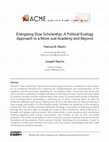
The term "slow scholarship" has become increasingly prominent in academia in recent years. It is ... more The term "slow scholarship" has become increasingly prominent in academia in recent years. It is an analytical framework for critiquing the neoliberalization and corporatization of the academy, and the associated "speeding up" of academic labor. The phrase also serves as a call to transform institutions of higher education so that they are more responsive to the needs of academic workers and the students whom they serve. For proponents of slow scholarship, such a transformation necessitates a stretching out of time, a slowing down, to allow for enhanced reflection and inquiry. Missing thus far from the discussion of slow scholarship is how energy, particularly of a fossil-fueled variety, facilitates the speed-up of the academy. Indeed, the "fast" academy requires high levels of energy consumption. Employing a political ecology lens, we thus seek to enlarge the scope of slow scholarship, while pushing for a broader and deeper political project. We contend that a more expansive slow scholarship requires grappling with energy consumption and mobility as well as their associated inequities. This entails, as we explore in the conclusion, a project of justice that transcends the boundaries of the academy. Such a project involves "stretching the boundaries of care" to recognize, include and transform the human and non-human assemblages that help make contemporary academia possible.
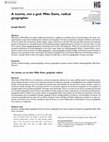
Human Geography, 2023
Mike Davis (1946-2022) was a leftist intellectual and activist, in addition to a prolific author ... more Mike Davis (1946-2022) was a leftist intellectual and activist, in addition to a prolific author on myriad subjects. His major writings focused on topics that included power relations and inequality in US cities, particularly in Southern California: the history of the car bomb; the ties between climate change, empire, and famine in the late 19th and early 20th centuries; the explosive growth of shantytowns in the global South; and the political ecology of global pandemics. Trained as a historian, Davis, in many of his works, heavily engaged geographical scholarship, both human and biophysical. While he is perhaps best known for his outsized contributions to urban geography, he also had a major impact on radical geography. Herein, I explore Davis's contributions to three areas of concern to radical geographers: cultural geography, political ecology, and borders and territoriality. In doing so, I focus primarily on four of his books: City of Quartz, Ecology of Fear, Late Victorian Holocausts, and The Monster Enters. In the end, I consider Davis's ethics and implicit critique of modernity, as well as his geographies of justice and hope.
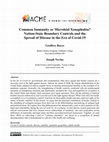
In the era of Covid-19, governments and commentators alike have argued that border controls are a... more In the era of Covid-19, governments and commentators alike have argued that border controls are a necessary tool in the fight against disease. Indeed, for much of 2020, the Trump administration in the United States adopted an almost singular focus on limiting transnational mobility as the lynchpin of its pandemic response. Ironically, this strengthening of border controls, combined with the uninterrupted operation of immigration detention and deportation, incubated the virus and amplified its circulation in the United States and abroad. Such outcomes raise many questions. How did the policing of national borders become embraced as such a pivotal tool in the fight against disease? What work does the border accomplish visa -vis pandemic control? And how do these public health outcomes shed new light on the nature of border controls? In this article, we argue that the principal contribution of border controls to the unfolding of contagion emerges from their role in the differentiation and policing of unequal legal and political status. We explore how this differentiation has demonstrably come to drive patterns of risk, harm and vulnerability during the era of Covid-19. As a contrast, we also discuss various grassroots and official interventions that have instead woven relationships of solidarity, care and cooperation across differences of nationality and legal status and their associated territorial expressions. Together, we read these efforts as cultivating a kind of "common immunity," one based on a recognition of mutual interdependence that is foundational to collective life, health and wellbeing.
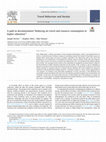
From "flight shame" or flying consciousness to Stay Grounded and FlyingLess, calls for, and organ... more From "flight shame" or flying consciousness to Stay Grounded and FlyingLess, calls for, and organized efforts to achieve, a marked decrease in flying in response to intensifying climate crisis abound. Of particular concern are frequent flyers, among whom are many in academia, especially in the high-income parts of the world. One manifestation is the proliferation of scholarship that critically analyzes academic flying while advocating for slower forms of travel, new forms of research and collaboration, and a low-greenhouse-gas-emitting academy more broadly. This conceptual article builds on that scholarship by engaging the growing literature calling for the decolonization of higher education institutions and the broader world. In doing so, and by attempting to bring into conversation two currently disconnected streams of literature, it explores how academic air travel both reflects and helps to reproduce patterns of colonial relations. Relatedly, the article considers how flying less contributes to the decolonization of higher education-especially in relation to "nature" and the appropriation of "the commons." By insisting on the inextricable entanglement of society and nature, it thus illuminates how aeromobility-related consumption both arises from and reproduces persistent inequities born of imperialism and coloniality. On this basis, the article pushes advocates of reduced flying and of decolonization to engage one another in a common project to challenge disparities between peoples and places, as well as interspecies ones, as they relate to aeromobility, consumption, and political ecology. ☆ We thank the anonymous reviewers and the guest editors for their valuable feedback on the various iterations of this manuscript. We also thank George Coiley, Juliet De Little, Joseph Hook and William Mai at the University of Sheffield for their support in reviewing literature on academic flying.
This article has been corrected with minor changes. These changes do not impact the academic cont... more This article has been corrected with minor changes. These changes do not impact the academic content of the article.
embodiment of a stark division between humans and nature. Overcoming such violence and facilitati... more embodiment of a stark division between humans and nature. Overcoming such violence and facilitating the thriving of humans and other-than-humans in the space of OPCNM requires a reworking of "nature" and territory-as well as of the associated human identities.
This article considers how migrant deaths -particularly in the borderlands of Europe and the Unit... more This article considers how migrant deaths -particularly in the borderlands of Europe and the United States -relate to the speed at which migrants travel. It argues that the most dangerous boundaries for migrants, and the most difficult ones to traverse, are those which embody the sharpest divides in energy consumption, divides reflected in the vulnerability of migrants who typically move at relatively slow speeds and have insufficient access to safe modes of travel. Thus, migrant deaths and the boundaries that produce them embody the injustices associated with grossly unequal levels of access to, control over, and consumption of environmental resources.

The global number of refugees, asylum-seekers, and those displaced within their countries are at ... more The global number of refugees, asylum-seekers, and those displaced within their countries are at record levels in the post-World War II era. Meanwhile, efforts by relatively wealthy and powerful nation-states to exclude unwanted migrants through enhanced territorial control have reached unprecedented heights, producing great harm—most notably premature death—for many. The factors driving out-migration from homelands made unviable, coupled with multiple forms of violence experienced by migrants, demonstrate the need for an expansion of rights—conceived of as both entitlements and sites of struggle. So, herein, I assert the need for " the right to the world " —specifically a right to mobility and a just share of the earth's resources—to help realize the promise of a dignified life for all. In making the case for such, the article offers a critical analysis of the contemporary human rights regime and of the " right to the city. "
Since 1980, the Cayuga Nation has worked through various U.S. politico-legal mechanisms to establ... more Since 1980, the Cayuga Nation has worked through various U.S. politico-legal mechanisms to establish sovereignty over land taken from them by European settlers and their descendants in what is today New York State beginning in the 1700s. When, in 2005, the U.S. Supreme Court refused to review a lower court's dismissal of their case, the Cayugas began purchasing land they claim from local (non-Cayuga) property owners. Relatedly, they petitioned the U.S. Bureau of Indian Affairs to place the land that they collectively own into federal trust, which would exempt them from various taxes. These efforts have engendered strong opposition from elements of the non-Native population, particularly the organization Upstate Citizens for Equality (UCE). This article interrogates the discourse URL: http://mc.manuscriptcentral.com/rtep

In 2008, U.S. immigration authorities raided the French Gourmet, restaurant, bakery, and catering... more In 2008, U.S. immigration authorities raided the French Gourmet, restaurant, bakery, and catering business in San Diego, California. They arrested 18 employees for working in the United States without authorisation, and ultimately deported most of them. The raid reflects a growing effort by the federal government over time to compel employers to cooperate with state-led efforts to police workplaces and effectively cleanse them of unauthorised workers. This paper traces the institutional genealogy of such efforts while demonstrating how they are part and parcel of a general “hardening” of U.S. socio-territorial boundaries and the growth of a state apparatus charged with policing those boundaries. In doing so, the paper seeks to illustrate how these developments articulate with the shifting nature of the state—in the contemporary United States and elsewhere—and how it defines and produces matters of security and wellbeing. It is a state that sits uneasily at the intersection of processes of neoliberalism, securitization, and the production of increasing precariousness for workers.
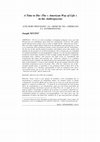
We live in a time of multiple, overlapping ecological crises, ones that threaten the very foundat... more We live in a time of multiple, overlapping ecological crises, ones that threaten the very foundations upon which the contemporary world sits. This article asserts that the source of these crises is what we might call the “American way of life.” This way of life is tightly linked to high levels of consumption and consumerism, as well as to a particular form of political economy closely associated with the United States. Yet the way of life and the political-economic and military power that enables and upholds it go far beyond U.S. territorial boundaries. This is because they are embedded in a global constellation of socio-geographical relations; it is also because populations beyond the United States, members of what we might consider the planet’s ecologically privileged class, embrace and practice the high levels of consumption and consumerism that reflect and reproduce the “American” lifestyle. It is a lifestyle predicated on dys-ecologism: the appropriation of an unsustainable and socially unjust share of the biosphere’s resources and, relatedly, the grossly unequal allocation of life and death circumstances across the planet. Thus, while the “American way of life” certainly benefits many, it contributes to the premature death of many more of the Earth’s denizens. It is, therefore, unsustainable in both an ecological sense and a socio-spatial justice one as well. For this reason and more, the article argues, the “American way of life” must be made to die.

This article analyzes the interrelationship between resource consumption, socio-spatial justice, ... more This article analyzes the interrelationship between resource consumption, socio-spatial justice, and what is popularly known as global warming by interrogating the ecological footprint of professional geographers, especially in terms of their conference-going involving air travel. In this spirit, the article introduces and employs the concepts of ecological privilege (as well as its inextricably related antithesis, ecological disadvantage) and dys-ecologism as a way to understand the roots and implications of professional geographers’ fossil fuel use, and those of globally advantaged classes more broadly. To illustrate this, the article measures the flight-related ecological footprint of the 2011 Annual Meeting of the Association of American Geographers (AAG) in Seattle. In doing so, the article examines how professional geographers, in the form of the AAG, have responded to their travel-related ecological footprint. It thus highlights the importance of scrutinizing the complex and dynamic interrelationships between consumption; associated socio-ecological benefits and detriments and their systemic manifestations; as well as hierarchy-related and power-infused categories of race, class, and nation—and their spatialities.
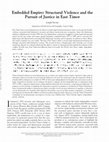
East Timor faces severe limitations in its efforts to realize legal and material justice and to o... more East Timor faces severe limitations in its efforts to realize legal and material justice and to overcome the horrific violence associated with Indonesia's invasion and almost twenty-four-year occupation. Since the Indonesian military's withdrawal in October 1999, the now-independent country has struggled to realize legal and material justice for the war crimes and crimes against humanity committed from 1975 to 1999 and to overcome the deprivation and dispossession associated with Indonesia's invasion and occupation. In relation to these efforts, this article examines two case studies. The first is East Timor's effort to secure legal and financial restitution for damages associated with Indonesia's actions. The second involves a disagreement with Australia over oil and natural gas deposits in a shared seabed and the effort to ensure an international-law-informed resolution of the conflict. In both cases, East Timor has fallen far short of its goals.
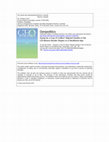
Well over 4,000 unauthorized migrants have lost their lives in the U.S.-Mexico border region sinc... more Well over 4,000 unauthorized migrants have lost their lives in the U.S.-Mexico border region since 1995. These deaths have occurred at the intersection of a dramatically strengthened U.S. boundary policing enforcement apparatus and persistent and arguably growing out-migratory pressures in Mexico and beyond. A number of the deceased have come from coffee-growing and –harvesting households and regions in Mexico and Central America, areas devastated by unstable commodity prices that reached their lowest point in a century in 2000-2001. This article explores the discursive and empirical interrelationship between a neoliberalized international coffee market, an increasingly policed U.S.-Mexico boundary, and migrant deaths. In doing so, it finds evidence to suggest that there is a causal link between the international crisis in prices received by coffee bean producers, out-migration by individuals in households and communities dependent on the coffee sector for their livelihoods, and migrant fatalities. It thus illustrates that the age of neoliberalism is one in which processes of nationalization, liberalization, and regulation exist simultaneously in space and time, the intersection of which in a world of deep inequality sometimes produces untimely death for those on the global socio-economic margins. Finally, the article highlights the limitations of extant research on this matter and lays out an agenda for future investigation.









Uploads
Books by Joseph Nevins
Academic articles by Joseph Nevins
On January 20, 2021, his first day in office, US President Biden issued an executive order pausing the remaining construction of the southern border wall initiated during the Trump administration. Soon after, the White House sent a bill to Congress, the US Citizenship Act of 2021, calling for the deployment of “smart technology” to “manage and secure the southern border.” Under Biden’s blueprint, $1.2 billion would be allocated for border infrastructure including “modernization of land ports of entry, investments in modern border security technology and assets, and efforts to ensure the safe and humane treatment of migrants in CBP custody.”
Our new report shows that whether “smart” or not, all border policing shares a common goal: to control human beings and to deny entry to those deemed undesirable or undeserving. It highlight five harms caused by border policing:
-A boom in the border and surveillance industrial complex
-The growing policing of immigrants and their communities, the borderlands, and society on a global scale.
-Separation and undermining of families and communities.
-The maiming and killing of large numbers of border crossers.
-Exacerbation of socioeconomic inequality.